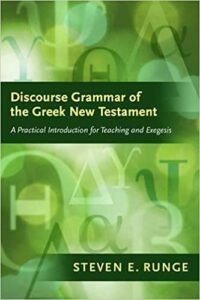I would like to follow up on three entries I wrote on January 30 and February 1, 2010 on the scope of a Hellenistic Greek grammar.
At about that same time (Feb. 2, 2010), Mike Aubrey posted an outline over at ΕΝ ΕΦΕΣΩ of what he would like to include in a grammar, and I thought of the various outlines those of us working on the revision of the Blass-Debrunner-Funk grammar had come up with 12 years earlier.
Today while reorganizing my office, I found a document mailed by Daryl Schmidt on January 30, 1998 to those of us working on the revision. It included his outline of the grammar as he perceived it at that point.
The outline he sent was definitely not final, and was the subject of much debate. It was one of several being discussed at the time. While the people on the committee had a good grasp of traditional Greek grammar, we had varying degrees of familiarity with the most recent models of linguistic theory, so there was a great deal of unease about terminology as well as the organization of the grammar.
I had many disagreements with Schmidt’s outline as it stood at that time, but understood it as representing his evolving understanding of the project, not a mandate for the form of the grammar. It was as a tool to prompt discussion.
I’m posting it below to invite your comments. The discussion of linguistics and Biblical Greek has come a long way over the last 12 years since it was written. Feel free to suggest where you would have made changes.
I, for example, would not structure a major portion of the grammar around the notion of “sentence” and would have much more to say about semantics and arguments structure. I’m sure Steve Runge (after a good laugh) could tell us clearly what’s wrong with the rudimentary section on “discourse” too.
Here is what Schmidt’s provisional outline included in January of 1998:
Introduction:
Sources: texts and mss
Grammar and Linguistics
Syntax: Words; Sentence types and patterns; Discourse units
Part 1: Grammar of Words
A. Introduction: rationale for categories
Lexical categories (“parts of speech”)
Formal features (morphology)
Grammatical features (e.g. gender, case, voice, aspect)
B. Major (“open”) classes: (heads of phrases)
noun, verb, adjective, adverb
C. Minor (“closed”) classes: (“function words”)
determiners, pronouns, prepositions, conjunctions
D. Subclasses:
Lexical properties
Syntactical features
Part 2: Grammar of Simple Sentences
A. Sentence structures
1. Elements of a sentence
agreement of subject & verb
2. Equative sentences
a. nominal (verbless)
b. with equative verb
3. Intransitive
4. Transitive
B. Nominal Phrases
1. Introduction: constituents (determiners, adjectives, nouns)
modifiers and modifier roles
2. Functions
3. Pronouns
4. Substantival (headless)
C. Verb Phrases (predicate clauses)
1. Introduction: constituents (verbs and adverbials)
2. Verb features
3. Verb chains
4. Adverbials
5. Complement patterns
D. Sentence Variations
1. Reflexive & Passive
2. Negation
3. Questions
4. Commands
E. Coordination
1. Within phrases and clauses
2. Compound Sentences
3. Comparison
Part 3: Grammar of Complex Sentences
A. Formation of complex sentences
1. Introduction
a. Subordinate conjunctions
b. Infinitive & Participle
2. Functions of Embedded Sentences
B. Nominal embeds
1. Indirect Discourse
a. Indirect Questions
b. Indirect Statements
c. Indirect Commands
2. Other Nominal Embeds
3. Nominal uses of subordinate conjunctions: summary
4. Nominal uses of infinitive, with
a. Verbs of discourse
b. Verbs of commanding
c. Causative verbs (ποιέω)
d. Impersonal verbs
5. Nominal uses of participle
C. Adnominal Embeds (adjective clauses)
1. Relative pronouns (incl. “substantive”)
2. Participle (incl. “substantive”)
D. Adverbial Embeds (adverbial clauses)
1. with subordinate conjunctions
2. infinitive (with τό, ὥστε)
3. participle (incl. Gen. Abs.)
4. conditionals
Part 4: Grammar of Discourse
Stylistics
Rhetoric
Discourse Structures
Narrative grammar
Appendices:
A. Phonology, Orthography, Accents
B. Morphology (incl. paradigms)
word-formation
catalogue of verbs
loan words & cognations
C. Sumaries & Lists
grammatical/syntactical category functions
e.g. case functions
use of participles & infinitives
correlation with traditional categories
So, what do you think a reference grammar of Hellenistic Greek should include? How would it be different from Schmidt’s model?
 Finally! I have overcome the crazy lack of standards for cell phone browsers. Lessons 1 to 18 are now HTML5 compliant and displaying correctly on Safari for iPhone and Chrome and Firefox for Android.
Finally! I have overcome the crazy lack of standards for cell phone browsers. Lessons 1 to 18 are now HTML5 compliant and displaying correctly on Safari for iPhone and Chrome and Firefox for Android.
 I’m working on Greek lessons in Miraflores, Lima, Perú. Lessons 1 to 15 are now HTML5 compliant.
I’m working on Greek lessons in Miraflores, Lima, Perú. Lessons 1 to 15 are now HTML5 compliant. Here’s the one at her parent’s house where I’m working these days. It’s a nice place to work on Greek grammar. If things go well, I’ll be able to complete the revision of the rest of the lessons before returning to the U.S. in August.
Here’s the one at her parent’s house where I’m working these days. It’s a nice place to work on Greek grammar. If things go well, I’ll be able to complete the revision of the rest of the lessons before returning to the U.S. in August.
 A few weeks ago, Mike Aubrey announced on
A few weeks ago, Mike Aubrey announced on